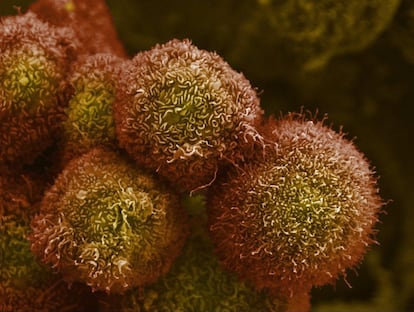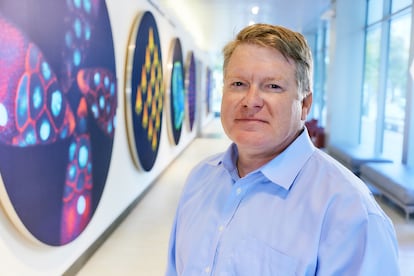The "hitchhiking vaccine" against cancer shows promising results in 25 people.


Cancer was practically a death sentence four decades ago, but since then, patient survival has doubled , reaching 55% for men and 62% for women in Spain five years after diagnosis, thanks to scientific advances. One of the great hopes for further improving prognosis is experimental cancer vaccines, which can include protein fragments characteristic of tumors so that the human body's defenses learn to recognize and eliminate cancer cells. One of the most ambitious projects, the injection known as ELI-002, presents this Monday the promising results obtained in an initial experiment with 25 people.
The new drug takes an ingenious approach. About 15 years ago, American immunologist Darrel Irvine 's team at the Massachusetts Institute of Technology discovered that experimental vaccines didn't work because they didn't reach the lymph nodes, where white blood cells capable of learning to identify and attack cancer cells are concentrated. Irvine, a physics engineer, and his colleagues then decided to design a vaccine that could " hitchhike " to the lymph nodes, in his own words.
The team looked for a means of transport and chose albumin , the most abundant protein in the blood, where its function is to carry substances such as hormones and vitamins. The Irvine group added a kind of fatty tentacle to the vaccine molecules, which successfully binds to albumin. Their initial results in mice, published in 2014, showed that the reaction of white blood cells in lymph nodes was 30 times higher with this trick.
The leap to humans materializes this Monday. Irvine and his colleagues created a company, called Elicio , to develop their hitchhiking vaccines. Their lead candidate is ELI-002, made with fragments of the human KRAS protein, whose mutations, often associated with smoking, cause millions of tumors. Alterations in KRAS are present in approximately 90% of pancreatic cancer cases and in at least one in three malignant tumors of the colon and rectum.
The first human trial of ELI-002, conducted with 25 patients, has concluded with promising results, according to gastroenterologist Enrique de Madaria , who was not involved in the study. “In this trial, the vaccine was designed to target two of the most common KRAS mutations. The results are encouraging: in people who underwent pancreatic cancer surgery, those who developed a strong immune response lived longer without the cancer recurring. This is the first time that a vaccine against these mutations has shown such a clear benefit in this disease,” applauds De Madaria, a specialist at the Dr. Balmis General University Hospital in Alicante.

Pancreatic cancer is one of the tumors with the worst prognosis, with approximately 510,000 diagnoses and 470,000 deaths annually worldwide, representing a mortality rate of over 90%. Twenty people with pancreatic tumors and another five with the disease in the colon and rectum participated in the clinical trial. All of them had previously undergone surgery to remove the tumor and chemotherapy, but still had microscopic traces of the cancer. The experiment did not include a control group—of patients who did not receive treatment—for comparison, but De Madaria emphasizes that the vaccinated patients lived without relapse "on average 15 months longer" than expected based on historical data. "Although the data are preliminary and larger studies are needed, this breakthrough opens the door to a new form of treatment not only for pancreatic and colon cancer, but also for other tumors with KRAS mutations," says the doctor, former president of the Spanish Association of Gastroenterology.
The new study, published this Monday in the specialized journal Nature Medicine , shows that, after an average of 20 months of follow-up, 68% of those vaccinated had developed a "potent" response from their T lymphocytes, the white blood cells trained against cancer in the lymph nodes. The authors of the trial - led by oncologist Eileen M. O'Reilly of the Memorial Sloan Kettering Cancer Center in New York, and her colleague Shubham Pant of the University of Texas MD Anderson Hospital - maintain that this stimulus to the human body's defenses "could delay the reappearance of the tumor." The experimental vaccine, which can be mass-produced industrially, is already in phase 2 of clinical trials, with a reformulation to attack cancer cells with seven types of KRAS mutations, instead of just two like the current one. If it works, "it would be a paradigm shift," according to De Madaria.
EL PAÍS





